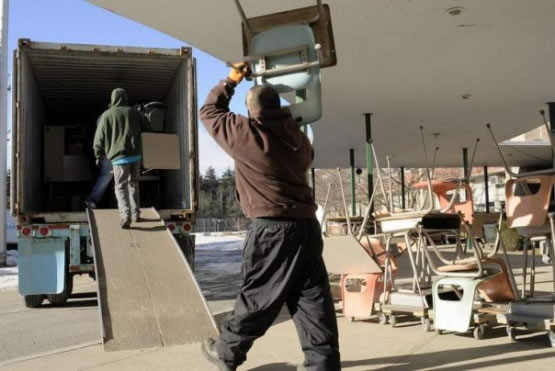
GLOBAL: Salesian Missions Partners with Institution Recycling Network, Benefitting Programs Around the Globe
NEW ROCHELLE, NY (April 26, 2013) Salesian programs around the globe have received school and office furniture as well as workstations thanks to a new partnership between the Institution Recycling Network (IRN) and Salesian Missions. In recent months, IRN has sent shipments of furniture and workstations to Salesian sites in Haiti, the Philippines, El Salvador and the Dominican Republic. Additional shipments have been sent to Nicaragua, Guatemala, Honduras, Paraguay, Togo, and Liberia.
“IRN donations have furnished Salesian schools and development offices in Central America, South America, Africa, and Asia,” explains Jessica O’Connor, property and logistics officer for Salesian Missions, the U.S. development arm of the Salesians of Don Bosco. “We plan to continue working with IRN because they are a reliable partner who is eager to assist in our mission and provide quality donations to our programs.”
The Salesians are known for their education programs for youth around the globe. With countless elementary, secondary and university level educational centers as well as youth training and certification programs, the Salesians help to provide a direct path out of poverty for many youth and their families. Programs rely on donations such as those provided by IRN to keep facilities functional for students and staff.
The Institution Recycling Network was started in 1999 to match surplus items that need to be recycled with organizations and people who need them. Every education, commercial, and healthcare organization in the U.S. has surplus furniture and equipment they need to get rid of. Hundreds of millions of people living in poverty or recovering from natural disasters worldwide are in desperate need of the kinds of surplus goods these very organizations are discarding. IRN makes the match and facilitates the distribution of the surplus into the hands of the organizations and people who need it most.
“There was a clear match between Salesian Missions’ need for furniture and equipment for their worldwide projects, and the supplies of surplus to which IRN has access,” says Mark Lennon, principal of the Institution Recycling Network. “Salesian Missions has been an excellent partner.”
IRN partners with nonprofits who are known to be reputable and effective providers of relief and development assistance, and who are able to use the types of surplus that IRN can provide. The organization has a “wish list” from each of its nonprofit partners of the types and quantities of surplus they can use.
When a project comes to IRN, it makes a match against these wish lists and offers the surplus to the most appropriate nonprofits. At this point it is first-come-first-served; the first nonprofit(s) to express interest in the surplus project is the one to receive it. In many cases a single nonprofit will claim the entire project but in some cases, the surplus will be split among two or more nonprofits.
“There is almost infinite demand in the U.S. and worldwide for good quality surplus so IRN’s surplus program will continue to grow,” says Lennon. “The school or company that supplies the surplus pays IRN for the service of matching their surplus with our nonprofit network. In almost all cases they pay IRN much less than they would pay to bring in dumpsters and throw the surplus away.”
There is a three pronged benefit to the work that IRN does. The generating organizations profit by disposing of their surplus for less than the cost of throwing it away, while the recipient organizations profit from a very low cost source of quality furniture and equipment. Impoverished and disaster-stricken people benefit from furniture and equipment they otherwise would have no access to. And finally, the planet benefits from reuse of important resources.
“We know of no other organization in the country other than IRN that is able to match large quantities of surplus with qualified recipients, and then manage the entire project to remove and load the surplus for shipment,” adds Lennon.
About Institution Recycling Network (IRN)
IRN is headquartered in Concord, NH and is a cooperative recycling organization that works with more than 350 colleges and universities, hospitals, K-12 schools and private companies to improve the performance and economics of recycling. IRN negotiates transportation, processing and marketing of recycled commodities and provides a single point of contact to recycle dozens of different materials. IRN handles over 75 commodities – everything from cardboard and fluorescent lamps to concrete and Astroturf. IRN is known particularly for its effective recycling of unusual and complex commodities such as electronic equipment, construction and demolition wastes and surplus property. For more information about IRN, visit www.IRNSurplus.com.
About Salesian Missions
Salesian Missions is headquartered in New Rochelle, NY. The mission of the U.S.-based nonprofit Catholic organization is to raise funds for its international programs that serve youth and families in poor communities around the globe. The Salesian missionaries are made up of priests, brothers and sisters, as well as laypeople – all dedicated to caring for poor youth throughout the world in more than 130 countries, helping them become self-sufficient by learning a trade that will help them gain employment. To date, more than 3 million young people have received services funded by Salesian Missions. To learn more visit www.salesianmissions.org.
